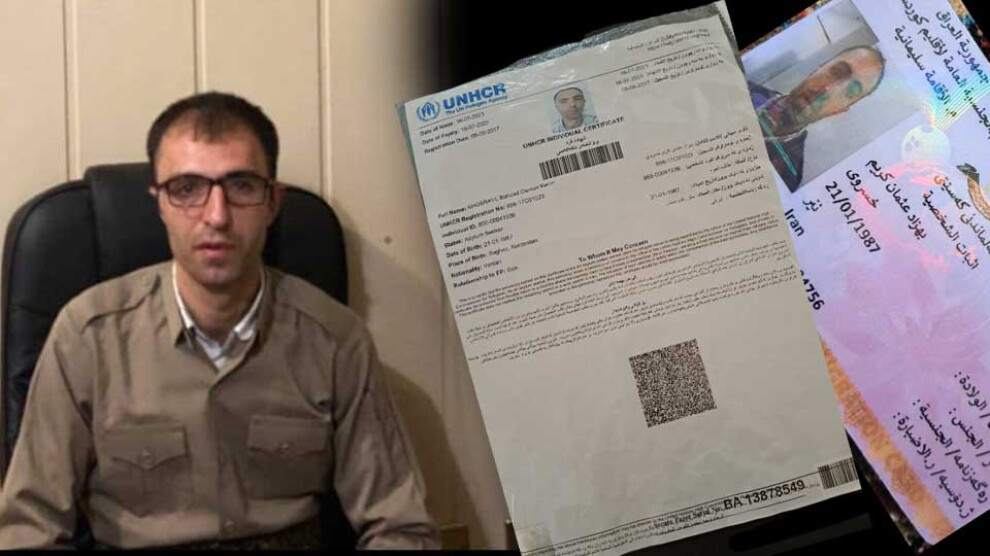KHRN: Kurdish asylum seeker Behzad Khosravi was extradited from Iraqi Kurdistan to Iran
Behzad Khosravi, who had been living in the Kurdistan Region since 2014, was arrested on 18 August and handed over to Iranian authorities.
Behzad Khosravi, who had been living in the Kurdistan Region since 2014, was arrested on 18 August and handed over to Iranian authorities.

The Kurdistan Human Rights Network (KHRN) reported that Kurdish asylum-seeker Behzad Khosravi, a member of the Democratic Party of Iranian Kurdistan (PDKI), has been handed over to Iranian authorities after being detained by security forces in Sulaymaniyah, Kurdistan Region of Iraq, according to his family.
Khosravi, who had been living in the Kurdistan Region since 2014, was arrested on 18 August.
His family learned of his extradition through a phone call from the Ministry of Intelligence to his brother in Saqqez, Kurdistan Province, according to KHRN.
The asylum-seeker’s sister, Bigard Khosravi, spoke to KHRN and said: “Our family has been living in the Kurdistan Region since 2014, and Behzad joined the Democratic Party of Iranian Kurdistan in 2017. On 14 August, my brother was summoned to the security office in the Kurdsat neighbourhood of Sulaymaniyah. He was a labourer, and as he could not take the day off work, he went to the security office the next day, where he was interrogated for several hours. At the same time, the security office contacted us and asked us to bring Behzad’s mobile phone. After giving them the phone, they forced Behzad to give them his password and finally, after several hours, he was released on bail.”
According to the sister, Khosravi is a “simple man who has never harmed anyone” and, confident of his innocence, returned to the security office three days later, on 18 August, to retrieve his phone.
Since then, the family has had no news of his whereabouts, the sister said, adding: ‘We went to the security office several times, but they did not give us any clear answers about my brother’s fate. Finally, on 1 September, my mother and I were summoned to the security office, where we were disrespected and threatened by the officers. They told us that Behzad had been transferred to prison and that they had no further information about him. They also told us that we had 10 days to leave Sulaymaniyah or we would be extradited to Iran. The level of insults and threats was so severe that my mother had a nervous breakdown on the spot.
Following the news that the Kurdish political asylum seeker has been extradited to Iran, the Kurdistan Region’s security organisation issued a statement on 6 September claiming: “Behzad Khosravi was not a political activist and was arrested for lack of a residence permit and returned to Iran at his own request”.
However, according to the residency card and a letter from the United Nations High Commissioner for Refugees (UNHCR), images of which were obtained by the KHRN, Khosravi’s residency permit in the Kurdistan Region is valid until 13 December 2024 and he is registered with the UNHCR as a political asylum seeker.
The PDKI also issued a statement on 7 September confirming that Khosravi was a member of the party and had been extradited to Iran by the security office in Sulaymaniyah, adding that the party would take legal action through the Kurdistan Region’s judicial system.
Iran and Iraq signed a joint security agreement in 2023, and in recent months Iranian military officials have pointed to provisions requiring the closure of Iranian Kurdish opposition camps in Iraq’s Kurdistan Region. Several activists and party members who had been living in camps near Sulaymaniyah were recently relocated under the supervision of the Kurdistan Regional Government.
Last year, Iranian and Iraqi officials announced the signing of a joint security agreement. Although the exact details of the agreement have not been made public, in recent months several commanders of the Islamic Revolutionary Guard Corps (IRGC) have indicated that, under this agreement, the camps of Iranian Kurdish opposition parties in the Kurdistan Region should be vacated and some of the members of these parties and political activists residing in the Kurdistan Region would be extradited to Iran.
In accordance with this security agreement, in recent days some members of three Kurdish parties – Komala Kurdistan’s Organisation of the Communist Party of Iran, Komala Party of Iranian Kurdistan, and Komala of the Toilers of Kurdistan – who had been living for years in camps in Zirgwez, Zirgwezla and Bana Gawra areas near Sulaymaniyah, were transferred in the last few days to camps near the city of Dukan in Sulaymaniyah Province under the supervision of the Kurdistan Regional Government forces.